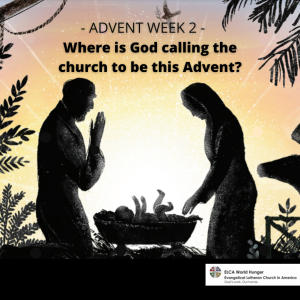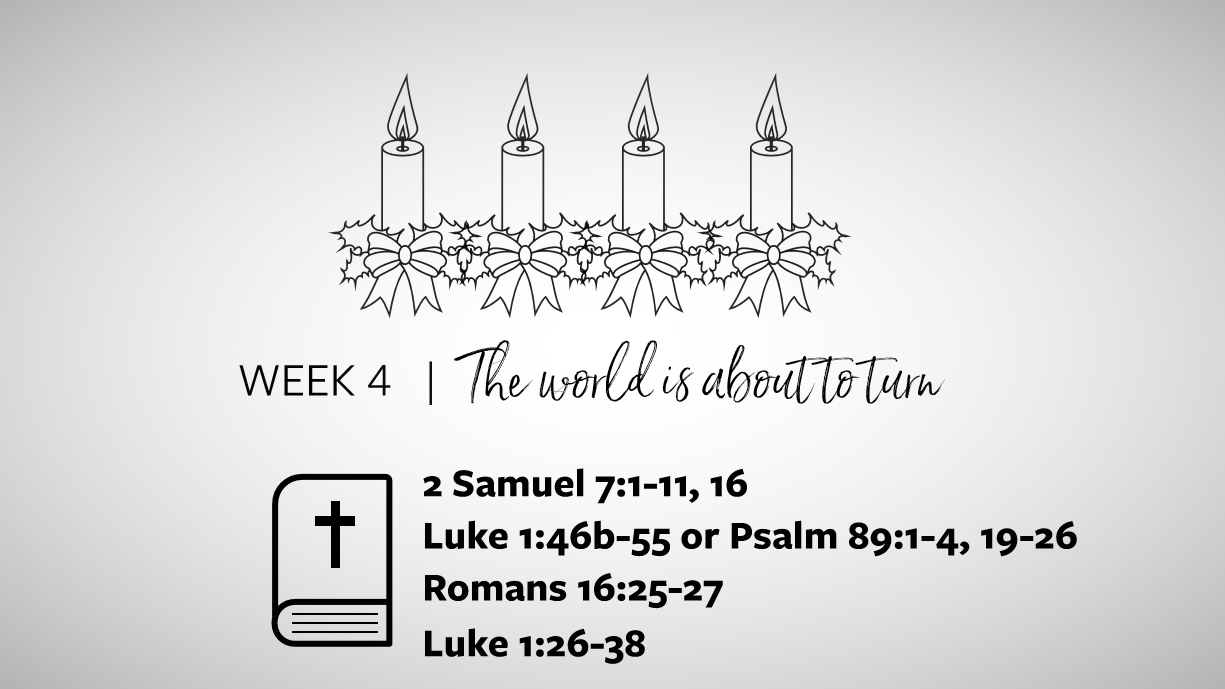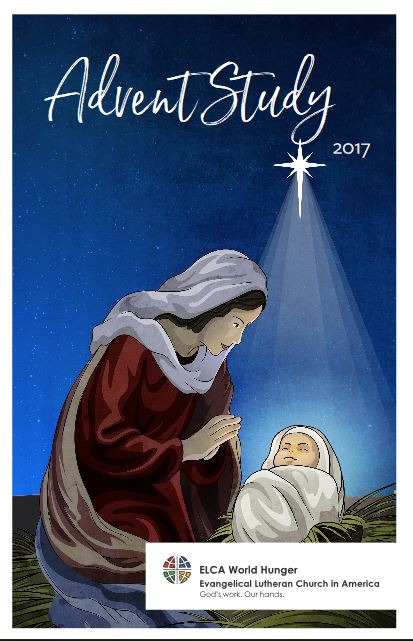Advent Week 2
“By the tender mercy of our God, the dawn from on high will break upon us.”
-Luke 1:78
This advent reflection is part of ELCA World Hunger’s 2021 Advent Study and ELCA World Hunger’s weekly Sermon Starter emails. You can download the full study here. You can also download the corresponding advent calendar here. You can sign up for the weekly Sermon Starter emails here on the right side of the page if on a computer or near the bottom of the page if viewing from a phone.
Reflect
Zechariah’s prophecy in the first chapter of Luke, our reading for this second Sunday in Advent, is sometimes overlooked in favor of the Magnificat of Mary in the same chapter. Mary’s song, which we will read later in Advent, is a theological ode to God, who “lift[s] up the lowly” (Luke 1:52). Zechariah’s prophecy, however, is a cry of joy for the God who fulfills God’s promise. Both Mary and Zechariah have longed with their people for this moment, have yearned for
the fulfillment of the promise that we heard on the first Sunday of Advent, when “Judah will be saved and Jerusalem will live in safety” (Jeremiah 33:16). Now, as Zechariah proclaims, “the dawn from on high [has broken] upon us” (Luke 1:78).
What does it mean for this new day to “dawn”? All too often, the church has tended to conflate metaphors of light and darkness with good and evil. The darkness of night is tied to fear, uncertainty and even despair, whereas the brightness of day symbolizes hope, joy and, in some cases, wisdom. But Zechariah’s proclamation of the coming dawn reveals more than the difference between light and darkness . Indeed, in much of Scripture the dawning of the day of
the Lord is far from a happy occasion. The prophets Micah and Joel both refer to it as “terrible,” and Amos chastises the people who long for it to arrive.
In the Bible and in life, metaphors of light and darkness are more complex than we sometimes assume. In life, the darkness of night can bring risk and uncertainty, as we heard in Charity’s story in the first session of this Advent study. Yet night can also be a time of rest, a symbol for the end of our labors. For the people of the Bible, living in hot, arid climes, the sun was necessary for growing food but its setting would bring a cool, restorative break.
For many of our neighbors who face housing insecurity, night and day each carry their own risks. As the sky dims, the need to find safe, suitable shelter intensifies. As the day dawns, the threat of eviction or displacement looms.
St. Andrew’s Refugee Services (StARS) in Cairo, Egypt, a ministry supported by ELCA World Hunger, accompanies vulnerable neighbors through these risks. The community based organizations supported by StARS are key partners in this work. When the COVID-19 pandemic forced many governmental agencies to close down or scale back their support of refugees
in Cairo, these community-based organizations remained open, providing critical support.
Hala, a 37-year-old Sudanese mother, was one of these neighbors. Her husband passed away during the first wave of COVID-19 in Egypt, leaving Hala to care for their four children. Forced to support them on her own amid the widespread economic uncertainty of the pandemic, Hala soon fell behind in her rent payments.
Knowing she needed some support, Hala turned to Amal School, an organization supported by StARS. Amal School provided her and her family with an emergency grant so that they no longer had to fear eviction. The school also provided Hala with a caseworker who helped her find a job. Now, her family has stable housing, her job provides much-needed income and Hala has the resources she needs to care for her family. She no longer worries about what they will eat during the day or where they will lay their heads at night.
The season of Advent invites us to journey with our historical forebears, such as Mary and Zechariah, and with our neighbors today, such as Hala. This journey is no metaphorical shift between night and day, darkness and light, but a real, lived transformation from the vulnerability we know surrounds us to the promise we know includes us. For Mary, this meant seeing the proud brought low and “the lowly” exalted by God. For Zechariah, it meant seeing the dawn break from on high. For Charity Toksang, in our first session of this study, it meant seeing the sunrise over a health care clinic in Juba, South Sudan. And for Hala and her family, it means sleeping in a home they won’t be forced to leave the next day.
God meets us where we are with a promise – that we will be reconciled, that the world is being transformed, that we
will live safely, securely and abundantly. God also meets us with an invitation – to participate in this reconciliation and transformation in the world.
Where is God meeting you this Advent? And where is God calling you to be in the new year?
Ask
- What does it mean to be vulnerable? What are some ways Hala and her family may have felt vulnerable? What are some ways you feel vulnerable in this Advent season?
- What does God’s promise of salvation mean for us today? What will “the dawn [breaking] from on high” look like in our lives?
- The term “housing insecurity,” used in the reflection above, includes not just homelessness but a variety of obstacles people face in finding a safe, stable and affordable place to live. Consider the terms “housing-insecure” and “homeless.” What’s the difference? What does it mean to have a “home”? What challenges does your community face in ensuring that everyone is “housing secure”?
- Where is God calling the church to be this Advent? How does our faith call us to accompany neighbors such as Hala as they work toward a better future for their families?
Pray
God of promise, we thank you for the darkness of night and the brightness of day, for the change of seasons, the passing of time and the promised future toward which you lead your world. Be present with us and with our neighbors around the world, especially those left vulnerable by rising costs and declining opportunities. Inspire your church to be part of your work in the world, ensuring that all can enjoy the blessings of safety, security, peace and hope that you provide. In your holy name, we pray. Amen.
Children’s Sermon
By Pr. Tim Brown for ELCA World Hunger Sermon Starters
Today the theme of “names” is noticeable by the Gospel writer.
Bring in a bunch of, “hello, my name is” name tags and a sharpie marker. You’ll need enough for each child plus enough for each child to take with them, with a few that are blank, and the rest filled in with “Lovely,” or “Beloved,” or “God’s Child,” or “Wonderfully Made.”
“Hi all! I’m so glad you’re here today.” Hold the name tags tightly in your hand out of sight. “Does anyone want to guess what I have here?” Give appropriate time for guesses “They are nametags! Tell me look at one youth What would you like me to write on your name tag? It can be your name, or it can be any name that you really, really like.”
Allow time for them to answer and write it on the tag.
“Anyone else?” Call on another youth “What name would you like?”
Allow time for them to answer and write it on the tag. Now, look out at the adult congregation.
“How about anyone in the seats? Anyone want a name tag? What would you like on your tag?”
Call on an adult. Allow time for them to answer and write it on the tag.
“In today’s Gospel lesson the writer names all these names: Pontius Pilate. Tiberius. Herod. John the Baptist. Zechariah. They name all these names because they want us to know what was going on in the world and who these people are. Names are important. You all have names. And God knows all of your names! But you know what? You also have other names given by God in your baptism, names you might forget. I want to show them to you, but they’re a surprise, so come in close.”
Invite the youth in close and show them the name tags.
<whispered> “You are all Beloved. You are all Lovely. You are all Children of God. And you know what? They are, too. <point to the assembly> “Each of you take a nametag to wear, and then take a name tag to give to someone out there, so that they can know what they are named by God, too. Ready? Go!”




